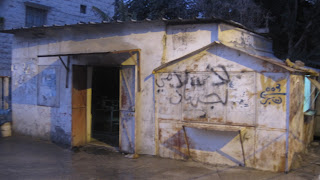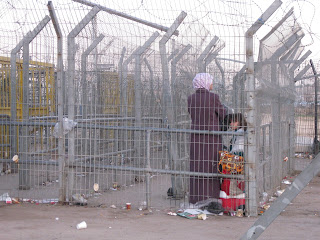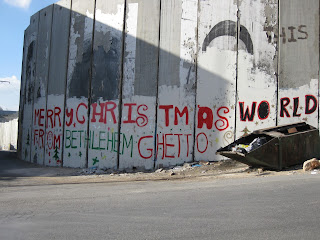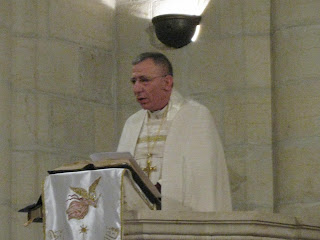This will be the last update I’ll be writing in 2010 because it’s already 9:30 p.m. my time and we’ll be ringing in the New Year 8 hours early than folks back home on the Prairie.
Our day started off at the third agricultural gate we have visited called the Deir Al Gushun gate. We arrived to view farmers gathered around a fire to keep warm until the gate opened.
 |
| Farmers Keeping Warm at Deir Al Gushun Gate |
Today we also visited with the two Christian families in the Tulkarm area. They are: Mouna, her mother and brother, Samir and Daoud (Arabic for David) of another family. Daoud is a successful businessman whose wife is an obstetrician in Tulkarm. He is an important contact for solidarity in this area as well. He is a goldsmith and his shop is located near the Old Mosque close to the fruit market. He gave Esther and me a tour of the Greek Orthodox Church located in the center of Tulkarm. On a very busy street he unlocked the door to the courtyard where the church is located.
That’s the most amazing thing about being here is everything looks similar on the outside and only when you are invited into places do you realize what’s behind locked doors. The courtyard was pleasant with miniature lemon and orange trees ready for picking. We picked a couple lemons and oranges right off the tree and ate them whole just like eating a large grape. And suddenly there was a burst of flavor of either lemon or orange. Yum!
That’s the most amazing thing about being here is everything looks similar on the outside and only when you are invited into places do you realize what’s behind locked doors. The courtyard was pleasant with miniature lemon and orange trees ready for picking. We picked a couple lemons and oranges right off the tree and ate them whole just like eating a large grape. And suddenly there was a burst of flavor of either lemon or orange. Yum!
Then he unlocked the door to the church. He told us the actual building was built around 105 AD.
Over all these years it has been a place of worship for the Christians in the area. Because of all the difficulties that have occurred since 1948 Christians started leaving the area. Now there are basically only two Christian families in the Tulkarm area.
In 2000 and 2001 life in Tulkarm was very unpredictable and there were bombs and fires that started. This church was the target of one of the fires and much of it was damaged except the original structure. The local community and the municipality pledged together with Daoud and his Muslim friend Adnan to rebuild and restore the church. By making this commitment, this community demonstrated respect for both the Christian faith and the Muslim faith. Walking into this most precious space and seeing how well cared for and beautiful it now is was inspiring to me.
There is no regular worshiping community at the present time but Daoud arranges occasional services with priests visiting from Bethlehem. He always informs the EA teams when those services will be held and invites us to join them.
 |
| Built in 105 AD-- Recently Restored |
Over all these years it has been a place of worship for the Christians in the area. Because of all the difficulties that have occurred since 1948 Christians started leaving the area. Now there are basically only two Christian families in the Tulkarm area.
In 2000 and 2001 life in Tulkarm was very unpredictable and there were bombs and fires that started. This church was the target of one of the fires and much of it was damaged except the original structure. The local community and the municipality pledged together with Daoud and his Muslim friend Adnan to rebuild and restore the church. By making this commitment, this community demonstrated respect for both the Christian faith and the Muslim faith. Walking into this most precious space and seeing how well cared for and beautiful it now is was inspiring to me.
There is no regular worshiping community at the present time but Daoud arranges occasional services with priests visiting from Bethlehem. He always informs the EA teams when those services will be held and invites us to join them.
We also walked over to visit Mouna, one of the few Christians in Tulkarm, and her mother. Esther and I wanted to wish them a Happy New Year. She lives in a tiny house and is very poor. But she, like most Palestinians, are extremely hospitable and she insisted on sharing goodies and coffee.
Many people also stopped by to visit as we ate apple slices, a sweet her mother had made, followed by a tiny cup of delicious Arabic coffee. (one small cup is enough!!)
Happy New Year everyone and may this year bring an end of the Occupation in Palestine.
Many people also stopped by to visit as we ate apple slices, a sweet her mother had made, followed by a tiny cup of delicious Arabic coffee. (one small cup is enough!!)
 |
| Mouna (in red) and her mother entertain us |
Susanne











































